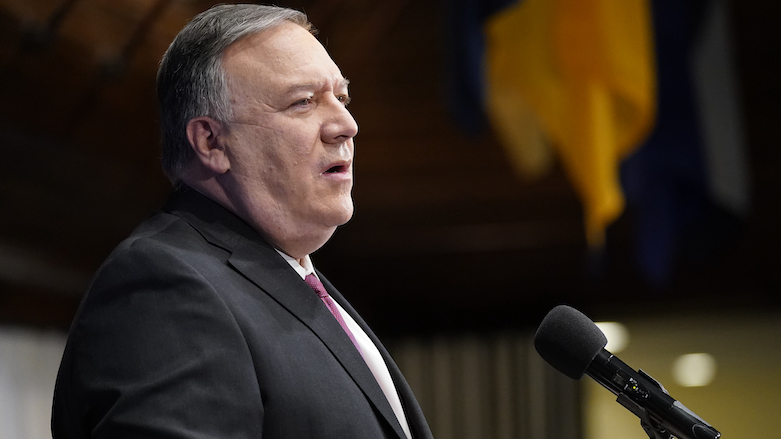Pompeo: Al Qaida has ‘new operational headquarters’ in Iran
US Secretary of State Mike Pompeo charged that Iran has established a new, close relationship with al-Qaida that poses a serious threat to US allies in the Middle East, European countries, and the US itself.

WASHINGTON DC (Kurdistan 24) – US Secretary of State Mike Pompeo charged that Iran has established a new, close relationship with al-Qaida that poses a serious threat to US allies in the Middle East, European countries, and the US itself.
“There’s no evidence Iran helped plan or had foreknowledge of the 9/11 attacks,” Pompeo was careful to state, as he spoke on Tuesday at Washington’s National Press Club and claimed that al-Qaida had dealings with Iran, going back three decades.
“In the early ’90s,” Pompeo said, “al-Qaida operatives traveled to Iran and the Bekaa Valley of Lebanon – the heartland of Hizballah – for explosives training.” And between October 2000 and February 2001, “at least eight of the 9/11 hijackers traveled through Iran.”
And after the 9/11 attacks, “hundreds of al-Qaida terrorists and their families fleeing America’s righteous vengeance took refuge” inside Iran, he said.
Tight Iranian Control over Al-Qaida
Yet at the same time, Tehran “imposed tight restrictions” on al-Qaida members who took up residence in Iran, Pompeo affirmed.
The Iranian government “very closely monitored” them, “putting them under virtual house arrest,” he continued.
Osama bin Ladin—who died in May 2011, during a US Special Forces raid in Abbottabad, Pakistan, some 75 miles north of Islamabad—“considered al-Qaida members inside the Islamic Republic to be hostages,” Pompeo said.
One point that Pompeo was making was to emphasize the control that Iran exercised over al-Qaida members on its territory. Terrorists do not freelance in Iran.
Such a view harkens back to an earlier US understanding of terrorism—before the Feb. 26, 1993, bombing of New York’s World Trade Center (WTC), which, itself, proved prelude to 9/11.
Before the 1993 WTC bombing, Americans saw terrorism as a national security issue and believed that major terrorist attacks were largely directed and sponsored by hostile states—a form of proxy war.
But Bill Clinton turned terrorism into a law enforcement problem, with the emphasis on the arrest, trial, and conviction of individual perpetrators. The prospect of state sponsorship was given short shrift (even as New York FBI, the lead investigative agency, suspected the WTC bombing was state-sponsored.)
Major Change in 2015
As Pompeo described relations between Iran and al-Qaida, he affirmed that in 2015—the same year in which the nuclear deal was concluded— “a sea change” occurred.
“Iran decided to allow al-Qaida to establish a new operational headquarters, on the condition that al-Qaida operatives abide by the regime’s rules governing al-Qaida’s stay inside the country,” Pompeo said.
Iran also gave the leaders of al-Qaida “greater freedom of movement” inside the country “under their supervision,” he stated.
Additionally, Iranian intelligence and the Islamic Revolutionary Guard Corps (IRGC) “have provided safe havens and logistical support—things like travel documents, ID cards, passports—that enable al-Qaida activity,” Pompeo continued.
Consequently, “al-Qaida has centralized its leadership inside of Tehran,” he said. “Ayman al-Zawahiri’s deputies are there today.”
However, Pompeo did not explain the whereabouts of al-Zawahiri, who replaced bin Ladin as head of al-Qaida, after the latter’s death.
And, notably, it has been many years since al-Qaida has carried out a major terrorist attack against the US or its allies. The US has ruthlessly hunted the terrorist group for the past 20 years, and it is not the organization it once was.
However, as Pompeo noted, if Iran were to decide to provide active support for al-Qaida, its current weakness would change radically and it would become a formidable threat again.
Pompeo also suggested that Iran was the “new Afghanistan”—what he called “the key geographic hub for al-Qaida.” While that could justify a limited US strike on Iran, it also justifies an objective that the Trump administration is actively pursuing: the withdrawal of a significant number of US troops from Afghanistan.
New Sanctions, including al-Qaida Kurdish Battalions
Pompeo also announced new US sanctions on two Iran-based al-Qaida figures, one of whom is Muhammad Abbatay, a 50-year-old Moroccan, who uses the nom de guerre Abd al-Rahman al-Maghrebi.
In addition to sanctioning Abbatay, the State Department’s Rewards for Justice Program announced a $7 million reward for information leading to his arrest.
The rewards program described Abbatay as “the longtime director of al-Qaida’s media arm, al-Sahab” and “the son-in-law and senior advisor” to al-Zawahiri. In 2012, following bin Ladin’s death, Abbatay also became “al-Qaida’s general manager in Afghanistan and Pakistan.”
In addition, three Iraqis, whom Pompeo described as “leaders of al-Qaida Kurdish Battalions,” were sanctioned.
Pompeo’s statement marked the first time US officials have mentioned such an organization. He described it as “an al-Qaida linked group that operates on the border between Iran and Iraq.”
That sounds similar to Ansar al-Islam, an earlier Kurdish group, located in the same area and which was friendly to al-Qaida. It was headed by Mullah Krekar—now in jail in Italy on terrorism charges.
In a prelude to the 2003 US-led war to oust Saddam Hussein, CIA paramilitary teams and US Special Forces were sent to the Kurdistan Region in 2002 to work with the major Kurdish parties to eliminate Ansar al-Islam.
The idea was to eliminate the enemy in the rear, and the entire story is wonderfully told by Sam Faddis in his book, The CIA War in Kurdistan: The Untold Story of the Northern Front in the Iraq War.
The three newly sanctioned figures in the “Kurdish Battalions” are: Ismail Fuad Rasul Ahmed, 44 years old, from Kirkuk; Fuad Ahmad Nuri Ali al-Shakhan, 41 years old, from Tuz Khurmatu; and Niamat Hama Rahim Hama Sharif, 48 years old, said by the State Department to be born in Tawilh, Iraq (may refer to Tawella.)
Editing by Karzan Sulaivany